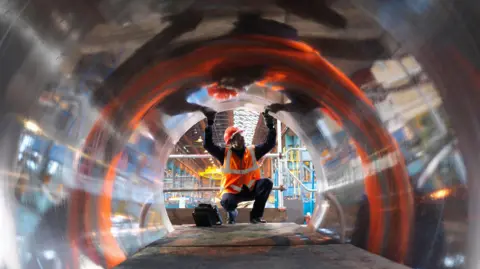UK not planning to hit back at US on steel tariffs
 Getty Images
Getty ImagesThe UK will not retaliate immediately to the renewal of steel and aluminium tariffs by the US, the government has said.
Trade minister Douglas Alexander said the UK would not have "a knee-jerk reaction" but "a cool and clear-headed" response.
Many in the industry are calling on Britain to join the EU and Canada who have said they will hit back against the policy announced by US President Donald Trump on Monday.
The tariffs, set to apply from 12 March, would mean any steel or aluminium coming into the US would be subject to an import tax worth 25% of its value.
The US is the world's largest importer of steel, counting Canada, Brazil and Mexico as its top three suppliers, and Trump sees imposing tariffs, which will be paid by companies bringing the the metal into the US, as a way of shifting away from foreign imports and boosting domestic steel production.
The UK is not a big supplier of steel to the US, with the country accounting for about 10% of British steel exports. However, for some suppliers of specialist products, trade with the US is much more important.
Gareth Stace, director general of the industry body UK Steel, said Trump had taken a "sledgehammer to free trade with huge ramifications for the steel sector in the UK and across the world" as he called for "stronger action" from the government.
"Our high-quality products serve key US industries, many of which cannot source these domestically. This is a moment where our countries should work together to tackle global steel overproduction, not to be at loggerheads," he added.
There are also concerns within the industry that the tariffs might not only hinder exports to the US, but could also lead to excess steel being "dumped" in the UK.
This is because if other countries are no longer exporting to the US, they may look to offload their steel at a cheaper price, potentially leading to UK steelmaking businesses being undercut.
Unite, the union representing UK steel workers, said Trump's announcement "should be a wake-up call for this government" as it called on it to buy more British steel in response.
UK ministers planned to meet the steel industry and unions on Tuesday and visit key steel companies later this week.
Speaking in Parliament, Alexander said the US deadline on tariffs coming into force would give the government time to engage with steel firms and unions in the UK, and also with US trade officials.
But shadow trade minister Harriett Baldwin said it was "a moment of great peril for the UK steel industry because the UK has failed to engage with gusto with the new US administration".
Liberal Democrat leader Ed Davey urged the government to show "urgency" in dealing with the issue and protecting jobs.
The UK's direction of travel on tariffs in general appears to be a clear attempt to differentiate it from other G7 allies' attempts to project strength to the White House.
Canada's industry minister François-Philippe Champagne has called the decision to impose tariffs "totally unjustified" and said its response would be "clear and calibrated".
Meanwhile, European Commission President Ursula von der Leyen said "unjustified tariffs on the EU will not go unanswered".
Prime Minister Sir Keir Starmer's spokesperson declined to say whether Trump was wrong to impose the tariffs.
"We will take a considered approach to this. We will engage with the US on the detail, but the government is clear we will work in our national interest and this issue is no different to that," the spokesperson said.
Trump has announced and threatened a host of import taxes since taking office, particularly aimed at countries and trading blocs, such as the EU, which export more to the US than they import.
Tariffs are paid by companies buying from overseas, not to the overseas companies selling to them.
The importing company may choose to pass the cost on to customers directly or to absorb the cost themselves, or simply to reduce imports. Foreign exporters could also decide to cut their prices to protect sales.
Trump introduced similar steel and aluminium tariffs in 2018 during his first term, but many countries, including the UK, were later able to work out exemptions.
The US president has said he will not consider any exceptions this time round, although it seems like he may set this rule aside for Australia.
Australian Prime Minister Anthony Albanese said he had spoken on the phone with Trump and that the US leader was considering an exemption.
Trump has also delayed previously announced tariffs on Canada and Mexico, prompting questions of whether the policies will all go ahead.
